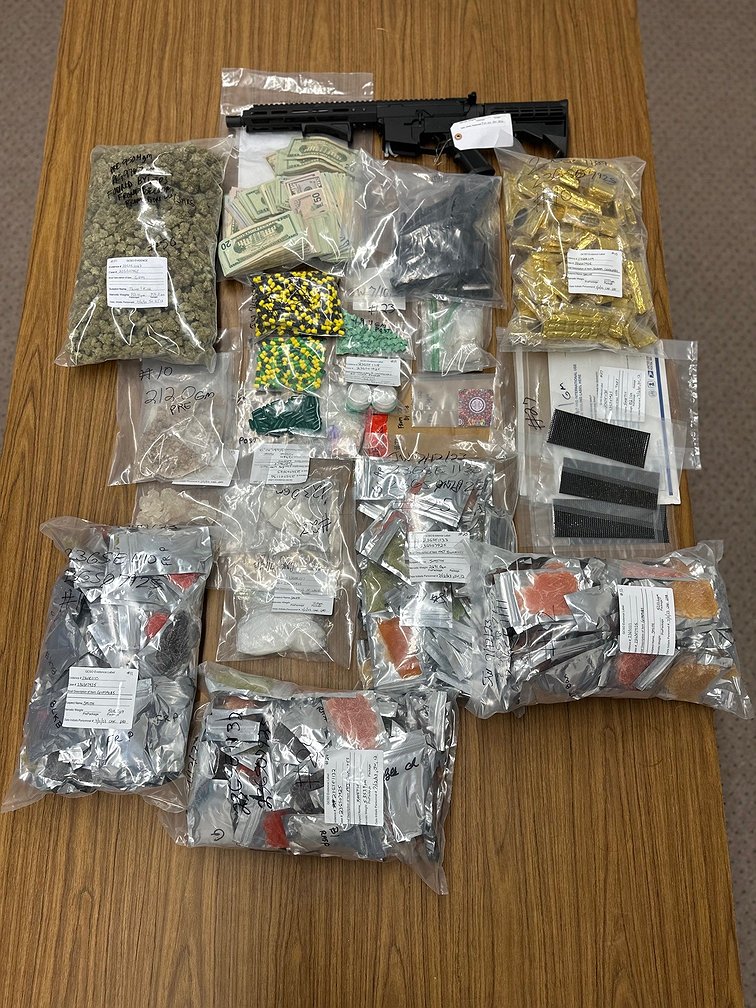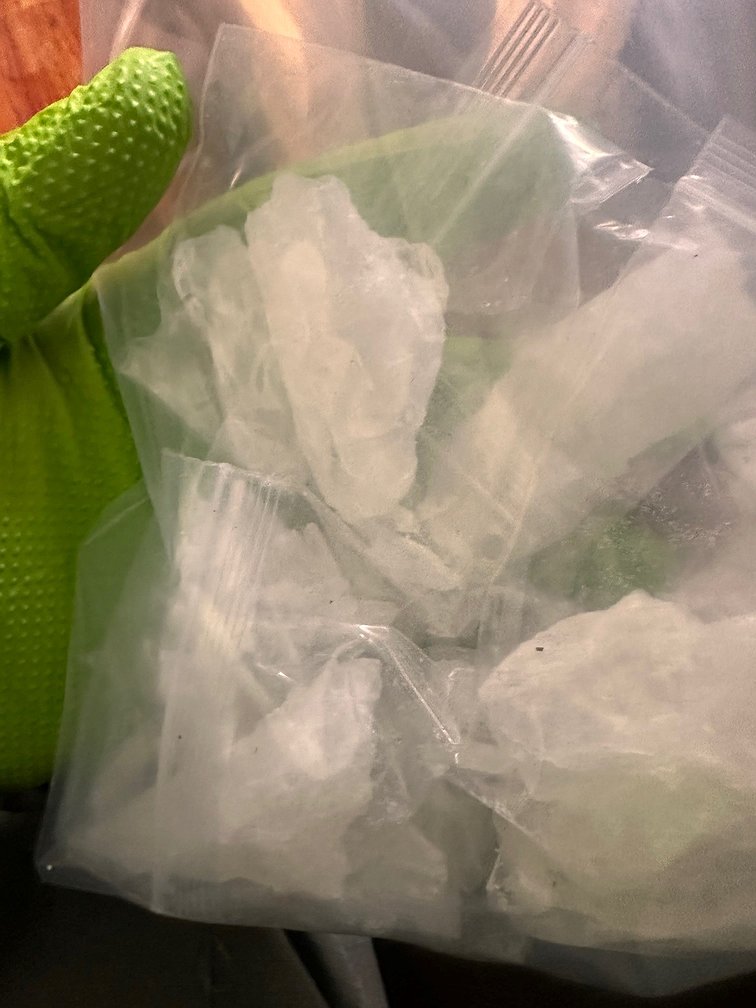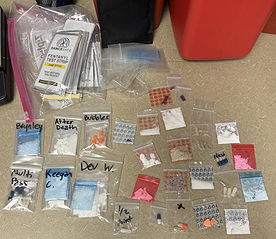iNET works at identifying, mitigating narcotics in the Basin
R. HANS MILLER | Hagadone News Network | UPDATED 1 year AGO
Managing Editor Rob Miller is a 4-year U.S. Army veteran who grew up in Western Montana in a community about the size of Soap Lake. An honors graduate of Texas State University, he enjoys spending time with his wife, Brandee, and their three dogs, Draco, Pepper and Cinnamon. He has one son, William. During his free time, he enjoys photography, video games, reading and working on the house he and his wife bought in Ephrata. He is passionate about the First Amendment and educating communities. | February 7, 2025 3:20 AM
EPHRATA – If you live in the Columbia Basin, you've seen coverage from the Columbia Basin Herald and other outlets regarding the prevalence of drugs such as fentanyl, methamphetamine and cocaine in the area. The Interagency Narcotics Enforcement Team, otherwise known as iNET, is tasked with fighting the drug epidemic in the region.
“We have a mission – I would say mandate – but our mission is to target middle to upper-level narcotics traffickers in drug trafficking organizations,” said the group’s lead detective. “... Our primary area of responsibility is Grant and Adams counties.”
The lead detective from the Grant County Sheriff’s Office and an iNET member from the Washington State Patrol sat down with the Columbia Basin Herald to discuss iNET’s formation and mission. We are not using their names here due to the sensitive nature of the work they do. They will be referred to as detective and trooper, respectively, throughout this story.
Formation
iNET was formed when funding became available through the Edward Byrne Memorial Justice Assistance Grant Program, the detective said.
According to the Bureau of Justice Assistance, the grant program honors New York City police officer Edward Byrne who was killed in 1988 while trying to protect a witness in a drug investigation. Initial funding from bills passed in 1986 and 1988 provided about $200 million to local municipalities to fund narcotics enforcement work. That subsequently led to the formation of iNET.
“That money was sent right to Washington State, as an example, and then Washington State divvied that money up to different task forces. That is how iNET was created,” the detective said.
Since last year, that money hasn’t flowed down to iNET, he said. He said he is unsure where the funding is going, but in the past, it would range from about $100,000 to $230,000 in funding for the task force, annually.
The Columbia Basin Herald has reached out to various government offices and will have a follow-up story in the coming weeks on the status of that grant funding.
The task force has grown into something unique, the detective said. It’s governed by an executive board and supervised by GCSO. The board is made up of representatives from GCSO, the Quincy Police Department and the Washington State Patrol.
In the past, the Adams County Sheriff’s Office, Warden Police Department, Othello PD, Ephrata PD and Soap Lake PD provided officers to the program as well, but staffing issues and funding have caused them to withdraw, the detective said. Moses Lake PD withdrew and formed its Street Crimes Unit a few years ago.
The lack of staffing is frustrating, the detective said, but said he feels that’s also a part of society not prioritizing drug enforcement as it used to. Addictive substances harm individuals and communities, but the effort to balance providing recovery resources and enforcement options isn’t where it should be. Decriminalization occurred and once that was seen as a mistake, the political motion in the enforcement direction seems insufficient from his perspective as the lead of iNET.
“Drugs became no longer important, and then the whole fentanyl thing kicked in, right? So now, there’s this fentanyl crisis. Now it seems important, but from a task force perspective, we're still at the same (impasse). We still don’t have the bodies to tackle this fentanyl crisis,” the detective said. “We need people.”
Recently, Grant and Adams counties were identified as part of a high intensity drug trafficking area, the detective said. As a result of that HIDTA designation, federal funding to help cover overtime and other expenses for iNET has become available. It also has provided funding for a Washington Army National Guard criminal analyst to help with cases.
“He’s not commissioned. He’s an Army guy under the rules of the governor, so he’s not allowed out in the field or anything, but he does a lot of our research and (intelligence collection) on our cases,” the detective said.
Current reality
iNET, as a result of the HIDA designation, is now considered a HIDA task force, which allows it to access funding. Given the challenges of the current drug enforcement environment, both the detective and trooper said the designation was a good thing. It won’t solve all of the challenges they face, but it does help draw attention to the area at all levels of government, though it paints a bad picture for the Columbia Basin because being designated as a HIDTA indicates the two counties have an above average narcotics issue.
Fentanyl continues to be one of the more common narcotics the task force sees, but it isn’t alone.
“It’s a huge problem,” the detective said. “In Gorge (Amphitheatre) season, our day-to-day operations here in Grant County are fentanyl, coke, meth and marijuana. There is still heroin, though, because we did just seize about two pounds – a lot – two pounds of heroin, which we hadn’t seen heroin in probably five years.”
The trooper explained that it isn’t marijuana from legal dispensaries that are causing the problems iNET investigates. Instead, it’s black-market cannabis that is shipped in by well-coordinated criminal organizations.
“And with anything that’s black market – stolen goods, illegal drugs, guns – it comes with violence, and it’s a primary source of income for criminal organizations. That is a huge problem (for) the local citizens, because that violence bleeds over into our communities. The way that the state implemented legal marijuana and the taxes that are associated with it makes black market marijuana very lucrative,” the trooper said.
For the drug dealing organizations, the business model is more refined than people may realize, and drug cartels are business-savvy groups, the trooper said.
“Diversifying your product is a great business decision, and those criminal organizations know that,” he said.
Black market grow operations are also dangerous for other reasons, the trooper said.
Locally, cases involving marijuana are often at illegal grow operations. Those grow operations may look legitimate to a citizen driving by, but they aren’t legal and the site is generally being utilized in a dangerous manner.
Chemicals get dumped into water and sewer systems and infiltrate the groundwater supply, causing damage to the environment and health risks for those nearby, the trooper said. Those chemicals also present health risks to the person who may buy the cannabis and smoke it. The grow operation’s efforts aren’t regulated, so there’s no safety measures in place such as a consumer might expect at a legal dispensary.
Another concern is how the gangs and cartels that are running an illegal grow operate, the iNET members said. Undocumented immigrants can end up being forced into a situation where they’re being trafficked for their labor. Brought up from Central or South America, the person may not know where exactly they are, and they’re often treated horribly. Food, medicine and general necessities aren’t a concern for the drug organizations. Another victim can be found to run the place if the current enslaved person dies.
“When we take down grow operations that are being run by organized crime, more often than not, the individuals that we arrest at those grows are, sadly, human-trafficked and are basically indentured slaves to those organizations. They have no choice in being there, and I’m taking that into consideration, but there are a lot of victims along the way,” the trooper said.
The detective said that, in a 2023 grow sting, two of the workers at the site were shot. That one grow had more than $8 million in marijuana if it’d been sold on the street.
The violence surrounding narcotics is a primary concern, as well. Whether it’s fentanyl or an illegal bag of marijuana, the money paid to a gang associated with a cartel eventually helps fund an organization that is violent on a global scale, the trooper said.
“If they’re buying (marijuana) from an illegal source, ultimately they’re contributing to the cartels in Mexico who are killing thousands of people, and they’re funding human trafficking, sex trafficking – basically, criminal organizations that are into all sorts of things,” the trooper said.
The detective added that he feels that, due to the way Washington legalized cannabis, the illegal grow operations tend to blend in. While shrub steppe may seem like it would be a foolish place to hide an illegal grow, such operations just don’t stand out to the community. Prior to legalization, the gangs and cartels were going to great lengths to hide grows in thickets and rough terrain.
“In the past two and a half years, they’ve all been hiding in plain sight,” the detective said.
Looking ahead
While staffing is an ongoing concern, the detective said interagency partnerships with local, state and federal law enforcement does help to some extent. Another officer from Quincy should take some pressure off and partnering with the MLPD Street Crimes Unit can be productive, the detective said.
Laws related to narcotics enforcement are being adjusted over time, though the process may be slow. During the current Washington State Legislative Session several bills are being considered by state lawmakers. House Bill 1331 would see delivery of a controlled substance leading to the death of a person or unborn baby being upgraded to Manslaughter in the First Degree.
Senate Bill 5213, sponsored by Senator Judy Warnick, R-Moses Lake, and three others would criminalize the possession of fentanyl without a prescription for medical purposes. Several others related to managing the use of cannabis and other drugs, including psychedelics, are on the agenda for the legislature.
HB 1331 would actually increase the penalties for Controlled Substance Homicide by adjusting the charges set forth in RCW 69.50.415 that holds the drug dealers accountable for overdose deaths caused by their products. In early December 2024, a Warden woman, Marla Ann Duplichan and an alleged accomplice, Joshua Jenkins, were charged with CSH under the statute. iNET was involved in that investigation.
Partnerships with other agencies such as the U.S. Drug Enforcement Agency, area sheriff’s departments and local police departments are important for the task force.
Quincy PD Chief Ryan Green said providing an officer to iNET to participate in the task force is important for his department because it keeps drugs from being a worse problem in the city.
“We recognize that crime isn’t tied to one specific jurisdiction,” Green said.
Drugs come into the country, travel into Washington state, then Grant County and eventually Quincy and the surrounding areas, the chief said.
“We reach out to our detective assigned to that agency, and they work together combating that issue. It’s a resource for our agency. We’re a small, rural agency and we don’t have the capacity to run our own task force, so we’re happy to provide a detective to (iNET) so that we can reap those benefits,” Green said.
While there is no active Quincy PD iNET member as of early February, Green said that will change in late spring or early summer as officers finish training and a detective is freed up to be assigned to the task force.
Green speculated that, without iNET, the fentanyl and other drug problems in Quincy and elsewhere in Grant County and the surrounding area would be significantly worse than it already is.
Captain Jeff Sursely, public information officer for MLPD, said his department pulled out of iNET directly because MLPD had grown to a size that it could start an internal team, the Street Crimes Unit, that would be able to focus on Moses Lake. However, that doesn’t mean the two groups don’t cooperate.
“Our Street Crimes team is more focused on Moses Lake, and what it’s created is a partnership where those units are working on narcotics jointly, communicating and draw off resources from both. So, it’s actually increased from us having one detective in that (enforcement role) to we now have four in our streets, which iNET can call in anytime to get resources,” Sursely said. “It’s become an extremely good working relationship.”
Sursely added that iNET takes the lead on countywide overdose homicide investigations, Sursely said.
Within the overall picture, all of the law enforcement agencies in the region cooperate on operations, including the task forces. Having a more well-staffed group at iNET with the other departments able to provide investigators dedicated to narcotics investigations would be helpful though, the detective said.
Both the trooper and the detective said the work can be rewarding, if sometimes dangerous. They ensure they’re mindful of safety at all times and they’re less noticeable because they’re usually in plain clothes and look like the average person rather than having a haircut or uniform that identifies them as officers. They conduct stakeouts and generally try to blend in while gathering information.
In the long run, it’s about keeping the community safe and being safe while they do it, they said.
“We keep on high alert,” the trooper said. “We police ourselves when it comes to safety.”
RCW 69.50.415
Controlled substances homicide — Penalty.
(1) A person who unlawfully delivers a controlled substance in violation of RCW 69.50.401(2) (a), (b), or (c) which controlled substance is subsequently used by the person to whom it was delivered, resulting in the death of the user, is guilty of controlled substances homicide.
(2) Controlled substances homicide is a class B felony punishable according to chapter 9A.20 RCW.
According to RCW 9A.20, the maximum penalty is 10 years in prison, a fine of up to $20,000, or both.
 Fentanyl, the blue pills in the baggies on the bottom-left of this photo, is one of the deadliest narcotics circulating in the Columbia Basin. Unlike fentanyl pills and patches issued by a physician, these pills don’t have a specifically measured dosage and one pill may have very little effect on the person who smokes or ingests it, while another pill may have enough of the synthetic opioid to kill a large adult. Firearms, cocaine and other evidence were also collected in the bust associated with this evidence photo.
Fentanyl, the blue pills in the baggies on the bottom-left of this photo, is one of the deadliest narcotics circulating in the Columbia Basin. Unlike fentanyl pills and patches issued by a physician, these pills don’t have a specifically measured dosage and one pill may have very little effect on the person who smokes or ingests it, while another pill may have enough of the synthetic opioid to kill a large adult. Firearms, cocaine and other evidence were also collected in the bust associated with this evidence photo.ARTICLES BY R. HANS MILLER

Suspect in 2022 murder of Moses Lake woman expected to change plea
EPHRATA — Juan Gastelum, 31, of Hermiston, Ore., the suspect in the March 2022 killing of Yanira Cedillos, is expected to change his current plea of not guilty to a guilty plea. Prosecutors in the case have requested that a plea change hearing be set for March 3, according to court documents.

Counselors help students plan ahead at Ephrata High
EPHRATA — Planning for the future isn’t something freshmen in high school gravitate toward, but the four guidance counselors at Ephrata High School point them in the right direction to get their futures planned.

Multiple projects coming to Ephrata in ‘26
EPHRATA — Multiple civic projects are coming to Ephrata this year as spring starts to waive at us from the not-too-distant future. Park upgrades, sports facility improvements and roadway upgrades are among them, according to Ephrata City Administrator Ray Towry.








